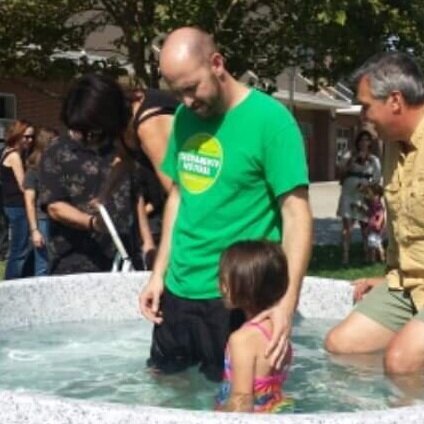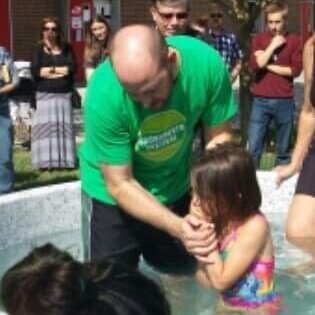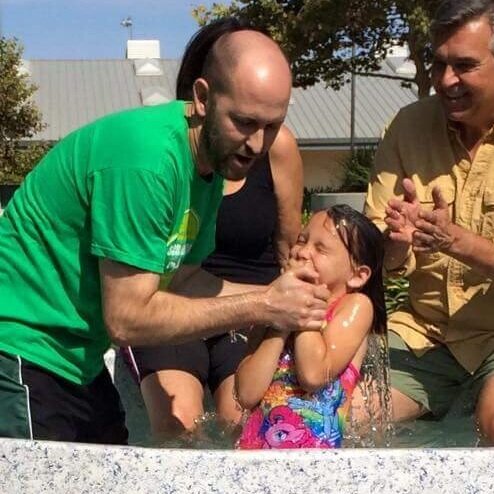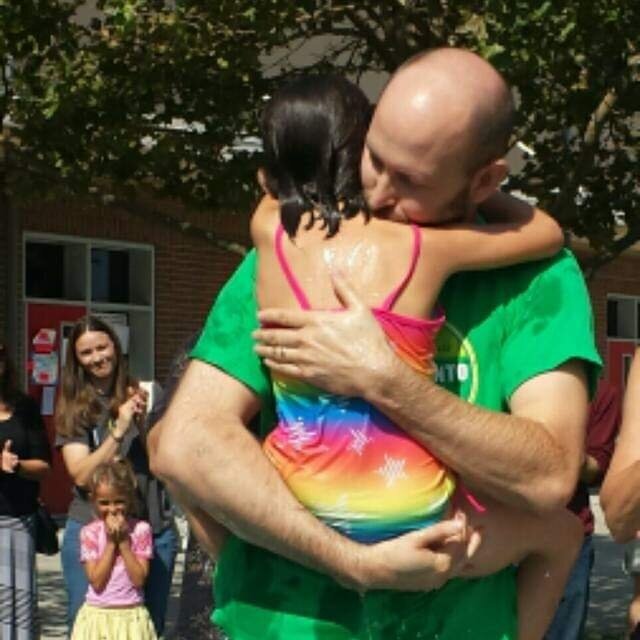Please Forgive Me - A Public Confession of Un-Faith
Confession of Bern Cathedral, Bernardine Cathedral In Lviv Church Of Saint Andrew, Vodnik, January 2007
At the time, it was one of the proudest moments of my life. Now it represents one of my biggest regrets.
“The Beginning of the End”
Usually that expression means that the final stage of something has begun, such as the last act of a story, the waning years of a career, or even the final phase of a human life. What I mean by it here is that new beginnings come at the end of every ending. And so yes, what I say now marks the end of a long journey but more importantly the embarking on a new one. The irony is that in doing so I am apparently letting go of the ‘hope’ of my prior convictions, only to find myself more hopeful than I had ever been. As the famed author and cartoonist Ashleigh Brilliant once said, “I feel much better, now that I’ve given up hope.” Those who ‘get me’ know that this isn’t a logical contradiction.
What I have to say now might not come as a surprise to many of you either. If you have been an attentive listener to some of the things I have written since my departure from evangelical Christianity, you might have been connecting some dots and all but concluded that this was inevitable. But just to remove any ambiguity, let me be clear at this point: the story that has ended is that of my journey to first come to understand, then believe, and ultimately doubt and reject the Christian faith. Now a new story begins, and yes it means a very different Kirt Lewis as well. I guess you can say that I am now a ‘born again’ post-Christian.
what i am not APOLOGIZING for
The primary purpose of this piece is to ask for forgiveness, but I want to make it clear that I am not apologizing for my decision to leave Christianity.
I know that for many close friends, family members, and colleagues over many years of ministry, this choice I am making will likely evoke a wide range of opinions and emotions. Some will choose to share these thoughts and feelings with me, including a number who will feel compelled to say things that are not so pleasant. It might even lead a few to end their relationship with me. This isn’t foreign to me as I’ve already experienced this in my exit from the evangelical church. The point is that however they choose to respond is their choice. Therefore, I will also not apologize for any mental or psychological turmoil they experience as a result of their response to my decision.
I should note that I fully expect to feel great anguish as well from some of these reactions. It’s already been far harder than I’ve let on to see once profoundly close and long-lasting relationships struggle and some even part ways. Yet I’m not going to ask that they apologize to me for this. Among the many reasons for my departure from Christianity, one of them is the perpetual deployment of expressed disappointment and passive-aggressive distancing, including the ultimate threat of separation and eternal judgment in Hell. I will no longer let these threats of shame and rejection control my choice to be authentically me. Nor will I hoist that burden upon others…at least that is my aspiration, although I know I have much re-programming to do. But above all, I will seek to honor the freedom of thought and choice.
And I wish that to be true even when I consider another’s thinking and choices as bat shit crazy! I might try to persuade people in my sphere of influence to consider rejecting what I see as lunacy. But unlike the dogma and wide-scale practice of all exclusive religions, I hope that I never coerce someone into agreement with my beliefs and lifestyles by making that conformity a pre-condition of my basic responsibility to fully accept and love them as fellow living beings. This leads me to the very sincere and sobering apology I do want to make today. But I’m not quite ready to share that before I first talk about those who influenced me to embrace Christianity in the first place.
embracing and rejecting my roots
Even though the number is rapidly decreasing, there are a lot of grown-ups out there who, like me, can say they “grew up in a Christian home.” That was true of my own parents, with my mom brought up in the fundamentalist General Association of Regular Baptist denomination and my dad spiritually hailing from the more progressive United Methodist Church. As far as I know, their parents—my grandparents—were raised in the church, as was my great-grandparents. You get the picture. And surrounding them was a small constellation of other family members, which for me included an older brother and several aunts and uncles, cousins, and a smattering of other shirt-tail relatives. With rare exception, they were all devoutly seeking to follow Jesus with the rest maybe best described as ‘Christmas and Easter Christians’.
Either way, it is undeniable that my family had a significant role in both exposing me to Christianity as they understood it and inviting me to follow in their faith footsteps. Indeed, a good number of them likely felt they had a biblical mandate and calling to “train up” their children, nephews, nieces, etc. “in the way” they “should go” (Proverbs 22:6 KJV). This burden is universal to most if not all religions of the world.
I want to say definitively right here that I have an amazing family. No, they are not perfect, myself very much included. But as someone who has spent most of his professional career in pastoral and social work, I have seen my fair share of families that are facing a shocking amount of brokenness including rampant abuse in all its varieties. Those kinds of struggles have thankfully been fewer and farther between in my familial tribe. And while we have at times been less present in each other’s lives, there has also been tremendous love and compassion extended to one another in seasons when one or more of us were facing great struggles.
Since it would take a small book to unpack all of the various influences of my entire family on my life as a Christian, I will just speak of two individuals here, those being my parents, Jim and Lorrie Lewis.
As I have written about elsewhere, my mom passed away a little over four years ago. After successfully fighting off cancer five—yes, I said FIVE—times, her sixth bout proved to be too much. My mom and I had a special bond, probably not unlike many sons and their moms. She had an uncanny ability to read me in a way that only a very few others have managed to match and only one was able to eclipse. And she was deeply moved by what she understood as the love of her Savior, Jesus Christ. More than that, she considered this love to be the foundation upon which her life of extraordinary service would be built.
My dad is one of the kindest and most compassionate human beings you will ever meet. To this day, his heart still beats to serve those with developmental disabilities as he and my mom did for over forty years. Beyond these fantastic qualities, he’s got a wonderfully dry sense of humor and a demeanor that puts even the most apprehensive of souls at ease. When people say that I remind them of my dad, I take that as a very high and humbling compliment.
Now I have come to believe that the admirable aspects of my mom and dad and so many other members of my family are less attributable to their faith than they believe and more likely the result of a strong sense of basic human decency. But setting that aside, I fully embrace their abundant examples of love and seek to share this legacy with my children.
Now comes the hard part. I’m angry at my parents for passing on to me the Christian faith and the manner in which they did so. Some of you who have known my parents personally are probably getting really upset right now at the gall I must have to be angry about the faith that my parents so genuinely presented to their children. But as you will see in a few minutes, I fully recognize that the same standard must be applied to myself.
leading others astray
When discussing regrets, people will often imply that, if they could, they would magically go back in time and alter the history of how they lived to more pleasantly align with that which they now hold as true. But in the end we all know that no amount of regretting can change our past. More importantly, it’s likely impossible that we would have ever even come to ‘see the light’ as it were had it not been for our past failures. Our evolution, individually and as a species, seems to require ‘trial and error’. With that in mind then, effective regret is rather a sober recognition that one was once a fool and no longer wants to continue being one. It’s also a admission that he or she not only hurt others because of their foolishness but likely led others into the same folly, exponentially furthering the negative consequences which come from any delusion and it’s inspired behaviors.
It seems like this is especially true when you are in a position of leadership or ‘authority’. An essential practice of those in these kinds of roles is that of teaching. We ask questions and share what we believe to be the answers to those questions. Even when we aren’t providing answers, we often heavily influence the outcome of the learner’s inquisition by framing the discussion and providing the ‘good’ sources where he or she may go to discover the truth. This might be why the Scriptures not so subtly threaten that, “Not many of you should become teachers, my fellow believers, because you know that we who teach will be judged more strictly” (James 3:1 - NIV). While that verse wrongly encourages teachers to comply with divine dictates in view of potential punishment from a vengeful God, the principle can be rightly applied to a more mature habit of self-reflection and accountability for any of us who hold, formally or informally, a mentoring function in the life of other fellow human beings.
Now like my parents, I have come to wield this tremendous power, first as a pastor and then eventually as a parent. And while some of this influence was regrettably directed towards other adults, it is the impact I had as a ‘spiritual leader’ to youth and children that I grieve the most. I now see that the world I formed in their impressionable minds was so small, so comfortable with contradictions, so desensitized to religious bigotry and violence, and so steeped in undeserved shame and judgment. If I was ever your Bible study teacher or Youth or Children’s Pastor, I humbly ask for your forgiveness.
While I deeply mourn this, it comes nowhere near the disgust I feel at having so naively passed on to my own children such a convoluted world view. This is especially true of my oldest, ten-year-old daughter, Melody. Which takes us back to the beginning.
Towards the end of August, 2015, she and I shared a moment that I thought was going to be one of the proudest of my life. Most Christian parents are deeply moved to see their children decide to accept Jesus as their Lord and Savior and to mark that decision by following in the ancient ritual of baptism. Fewer still get the opportunity to personally baptize their children, but that is precisely what I got to do as a pastor at the church our family then attended. Now I look back at that moment and regard it as the culmination of a grievous offense. So I would like to finish here by speaking directly to Melody.
I taught you what I thought you should believe but failed to teach you how to think. I told you to be curious and explore and then, in the name of God, put blinders on that vastly limited your ability to discover and become who you are meant to be and the potential you have to display truly unconditional love without abandon. And as your true dad, I held up for your admiration the image of a ‘Heavenly Father’ who, for all his claims to be all-loving and just, is largely found to be vain, volatile, and violent. For all of this, I am very, very, very sorry.
You have every right to be confused and angry towards me about this, just as I am justified in being angry with my parents and other adults who taught me about Christianity at a young age. It’s especially o.k. for you to feel this way towards people who are close to you, as the deepest anger is usually reserved for those we love the most. Yet I hope that, in time, you will forgive me and that we can together explore a much larger universe full of new wonders and purposes. And please know that, in the end, I will take great pride in you not based upon the standard of you thinking and living like me, but in you freely and fearlessly becoming all you desire to be and all you want to accomplish.
I love you very much,
Dad.




